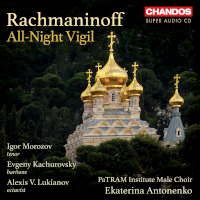Review by Henry Fogel
RACHMANINOFF
All-Night Vigil,
op. 37 (arr. Gretchaninoff/Lazarev/Sheehan)
•
Ekaterina Antonenko, cond; Igor Morozov (ten); Evgeny Kachurovsky
(bar); Alexis V. Lukianov (bs); PaTRAM Institute Male Ch
•
CHANDOS 5349 (SACD: 70:13  )
)
It is important to understand from the outset that this recording is not directly competitive with the many recordings, some of them excellent, that Rachmaninoff’s All-Night Vigil has received. He wrote the work for a standard mixed SATB choir. The version here has been arranged for an all-male choir. The seventh number, “Six Psalms,” was arranged by Alexander Gretchaninoff; the other movements were arranged by two other hands, the Russian Dmitri Lazarev and the American Benedict Sheehan.
Obviously, the colors of the music when performed by a male choir are going to be darker than what we are used to. This is particularly true because this performance includes eight oktavists, gathered from Russia, Canada, and the United States. An oktavist is a bass whose voice extends below the normal bass range, even below a basso profondo. The presence of eight such cavernous voices gives an extraordinarily rich color to the performance.
PaTRAM is the acronym for the Patriarch Tikhon Russian-American Music Institute, an American organization located in Tiburon, California. Patriarch Tikhon (1865–1925) was a bishop of Moscow and apostle for America. Collectors of Russian choral music will already be familiar with the stunningly beautiful quality of PaTRAM’s work, which has been reviewed enthusiastically in Fanfare and elsewhere. The blend of voices is just about perfect, intonation is flawless, and dynamic shading exquisite. This performance is at the slow end of the spectrum for this work, but there is no sense of dragging. The variety of color, and the combination of intensity and beauty in the singing, assure that one’s attention never wanders.
Ekaterina Antonenko is a Moscow-born choral conductor who studied in Russia and now has an international career. Ironically, her heritage is Jewish—her grandfather was a cantor at a synagogue in Ukraine. She sculpts phrases firmly and elicits singing of remarkable quality from her forces. Anyone who loves this work will want a recording with mixed choir (my preferred one is conducted by Alexander Sveshnikov, now available from High Definition Tape Transfers (HDTT 9685)). But I would not be without this all-male arrangement, either. I found it a deeply moving experience.
Chandos provides the Cyrillic text alongside an English translation, although a transliteration would have been more useful to the many who don’t read Cyrillic. The recording engineers deserve praise for the warm, reverberant, but still clear recorded sound. I listened to the SACD in two-channel stereo. The recording was made at the Russian Orthodox Convent Monastery Church of the Ascension on the Mount of Olives in Jerusalem. Henry Fogel






















